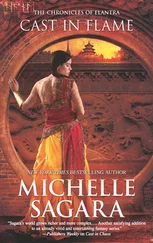“Yes. Understand that in a world without magic, door wards and streetlights would not function. In order to utilize magical energies, there must be some sort of conduit—in most cases, training. But not in all.”
“And the Illumen—”
“Yes, the importance of the praevolo in this escape was critical. It was the duty of the anointed to find a different world; the Aerian ancestors entered the etande without a compass.
“The praevolo is said to have preserved the power of flight for the people, and the praevolo followed a trail that only they could see; it led to this world. It is here they arrived—a world of Dragons, Barrani, humans, Leontines.
“And here, too, there was Shadow.”
“Too?”
“I believe—although I am not certain, as the legends were somewhat garbled—”
“That it was Shadow that drove the Aerians from their first home,” Moran said quietly. “At least that is most of our tale. The Shadows deprived our wings of flight.”
“You are skeptical?” Nightshade asked her.
“Yes, actually. The Shadows seem a thing of magic, to me. But it’s possible that, to destroy Shadow, the ancestors found some way to destroy magic. I don’t think they understood what the cost would be, and I think that the Shadows did wane in that world. But the people could not survive—not as they had.”
“Ah. And so, indirectly, the necessities of war with Shadow did cause the death of flight.”
Moran nodded.
“So the praevolo was born during that time?” Kaylin asked.
“It’s complicated,” Moran finally replied. “Understand that we have legends and tales; we’re not Dragons. We don’t have ancient Records to which we can refer. I’m not sure that born is the right word.” She hesitated. “It’s the word that’s been used. In theory, the praevolo is born to the Aerian people at a time of great need or great conflict. But I believe, even in the tales that are handed down, that the first praevolo was born then.”
“You don’t think born is the right word?”
“I was born. I wasn’t created. There was no cabal of ancient, powerful mages standing beside my mother as she conceived me; there were none in the birthing rooms where I was born.” Her smile was wan. “When I first encountered Records in the Halls, I searched them. And I went outside of the Halls, searching. I wanted information.”
“Were you not told anything about your wings?”
“I was told a great deal,” Moran replied. “I heard times beyond count that I was unworthy of the gift I had been given. I was told constantly about humility, chief among the characteristics I was to develop to be worthy.”
“Yes, of course, dear,” Helen said, although no one had spoken. She carried a drink—a hot drink, in a very mundane mug—to Moran, and set it in front of her, where lazy swirls of steam rose.
“I asked, in the beginning, what I was to be worthy of.”
Kaylin leaned forward, hurting for the child that Moran had been, and hoping it didn’t show. No one wanted pity, and Moran was not that child now.
“I was told that to prove my worth, I was to respect the authority of the Caste Court. They were wise and learned and of course, deserved their positions by consequence of birth. I was a bastard, illegitimate, and my father refused to step forward to claim kinship with me. I still don’t know who he is,” she added, staring at the rising steam as if reading some fortune in it. “I doubt I’ll ever know.”
“Would it make a difference?” Teela surprised Kaylin by asking. “Before you reply, I feel it necessary to point out that I killed mine—and I spent centuries building enough of a power base that I could survive doing so. He murdered my mother.”
Moran took her time digesting this information; it wasn’t information the Barrani who worked in the Halls would ever think to share. Her wry grin, and eyes that were now drifting into a more normal Aerian gray, cut years off her apparent age. The grin dimmed. “It’s possible that my father murdered my mother. I don’t know. He certainly did nothing to protect her, and he did nothing to protect me, either.
“But for all I know, my father might have been a younger son—no, less, a younger cousin, part of an Upper Reach flight in name only. He might have had no power.”
“You don’t believe it, though.”
“...No.” She shook herself. To Teela, she said, “Did killing him change anything?”
“Yes. I became the line.”
“That would never happen—I was illegitimate.”
“The Barrani do not fuss with legitimacy in that fashion,” Teela reminded her.
“I confess I don’t understand it; the Barrani inheritance wars are brutal enough when they start that legitimacy would seem to be of paramount import.”
“To an outsider, yes. But primacy is decided by power. What I take, I must be able to hold against all. If I am foolish, stupid or incompetent, I will die. The line, however, requires someone who is none of those things. My death might be regrettable, but it would be seen as necessary. And our children are not so numerous that the parentage defines them. The only exception is the lineage of the High Lord—and even in that case, new reigns are ushered in by politics and death in almost all cases.”
“Not the most recent one,” Kaylin said quietly.
“No. And believe, kitling, that there are lords who have been working constantly to ensure that the throne is in the hands of a ruthless, powerful man. A different man.”
Kaylin frowned.
“Told you,” Mandoran said as he turned to Kaylin. “He’s been fighting a constant succession war since the death of his father. It shouldn’t take more than another decade or two of your time before those challenges wither. Teela assumed you understood this.”
“And that has nothing to do with our current predicament.” Teela sent Mandoran a death glare; it didn’t faze him at all. “You do not know your father. Of your wings, you know only that they are of great import to the Aerian people—but not how or why.”
Moran nodded, shaking herself out of the web of memory that Teela’s words had evoked. “What was I saying? The praevolo. I believe, although again, it’s conjecture, that our ancestors did not suddenly find themselves in possession of a miracle baby. Birth is not quite the word used, but there’s no analogy that I can easily think of in Elantran. Maybe blessing?”
Kaylin stiffened, but said nothing.
“And it’s clear, given the stories, that the praevolo of that time could both fly—soar is the word that is used to refer to him—and fight. His prowess in both was considered proof of the benevolence and love of our gods.”
“And their existence, no doubt.”
Moran nodded. “I’m not terribly religious.”
“You’re a Hawk, which requires an entirely different kind of stupid,” Mandoran said.
“Mandoran,” Helen chided, as if she were his mother.
“Am I offending anyone?”
“In all probability, no,” Helen replied. “But you are offending me.”
Mandoran went still.
“Hazielle, my first tenant, was quietly and devoutly religious. Kaylin, my current tenant, is devoted to the Hawks. You are a guest here, and greater leeway is given to guests—but you will not insult them.”
“I insult Kaylin all the time!”
“He does,” Kaylin said, partly in his defense. Mandoran didn’t appear to hear her. He was staring at Helen, and Helen—or Helen’s Avatar—returned that stare with emphasis.
“Fine,” Mandoran eventually said. His voice was all sulkiness, except for the bits that were humiliation. Kaylin wasn’t certain this was smart, but even if it was her house, she wasn’t Helen.
“No, dear,” Helen said gently. “But that’s why you can be my tenant. I could never live with another presence that was too similar to me.”
Читать дальше












